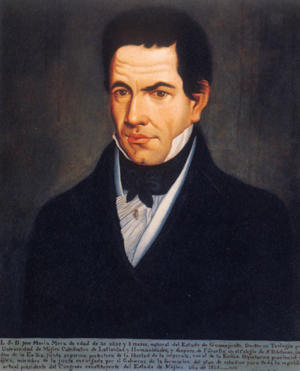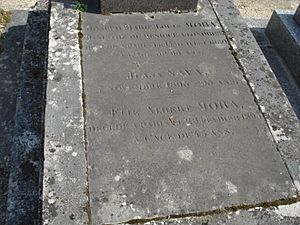José María Luis Mora facts for kids
Quick facts for kids
José María Luis Mora
|
|
|---|---|
 |
|
| Deputy to the Constituent Congress of the State of Mexico | |
| In office 2 March 1824 – 1 March 1827 |
|
| Personal details | |
| Born |
José Luis Mora Lamadrid
12 October 1794 Chamacuero, New Spain |
| Died | 14 July 1850 (aged 55) Paris, France |
| Cause of death | Tuberculosis |
| Resting place | Panteón de Dolores |
| Political party | Liberal |
| Alma mater | San Ildefonso College |
José María Luis Mora Lamadrid (born October 12, 1794, in Chamacuero, Guanajuato, and died July 14, 1850, in Paris, France) was an important Mexican thinker. He was a priest, lawyer, historian, and politician. He is known as one of the first people to support liberalism in Mexico. This idea meant he wanted the government and the church to be separate. Many people see him as the most important liberal voice of his time in Mexico.
Contents
Early Life and Education
José María Luis Mora was born in 1794. This was when Mexico was still ruled by Spain. His family was wealthy and of Spanish background, born in Mexico. They lost their money during the 1810 revolt led by Father Miguel Hidalgo.
Even so, Mora was able to attend the famous San Ildefonso College in Mexico City. There, he studied theology, which is the study of religion. In 1820, he finished his studies and became a priest. He also taught at the college and worked as a librarian.
Mora wanted to advance in the Catholic Church. But he faced difficulties. So, in 1821, he started focusing on politics. He became a journalist. After Mexico became independent in 1821, he became a liberal politician. He helped shape the new country. In 1823, he pushed for changes at San Ildefonso College. He wanted more modern ways of learning, using Spanish instead of just Latin.
Political Career and Ideas
After Mexico became a republic in 1824, Mora helped write the Constitution of the State of Mexico. He was also a member of the state congress. He thought the main Mexican Constitution of 1824 had problems. He didn't like that it only allowed Roman Catholicism as the official religion. He wanted religious freedom for everyone.
Mora also edited a newspaper called El Observador. Through his writing, he supported the idea that Spaniards should be allowed to stay in Mexico after independence. He also supported the Scottish Rite Masons, a group that promoted liberal ideas.
He was against Vicente Guerrero, a popular leader who became president in 1829. Mora supported Anastasio Bustamante when he took power from Guerrero. But when Bustamante became a dictator, Mora also opposed him.
Key Beliefs and Reforms
Mora's main ideas came from thinkers like John Locke and Benjamin Constant. He believed in protecting the rights of individuals. He thought that too much power in the hands of the people could lead to problems. He preferred a system where individual freedoms were protected from both the government and large crowds.
At first, Mora thought that giving political power to property owners would protect personal liberty. But he soon realized that these owners often sided with the Church and the army. These groups were against change. So, Mora began to think that force might be needed to bring about reforms.
Mora became very focused on reducing the power of the Roman Catholic Church and the army. He believed the Church had too much land and didn't use it well. He wanted the government to take over some of the Church's property. This was for financial reasons and because he believed in reducing the Church's special position. He also wanted religious freedom and schools that were not controlled by the Church.
In 1831, a law to limit the Church's power failed. So, the governor of Zacatecas state held a writing contest. The topic was about the government's right to take Church property. Mora won this contest.
Mora supported Vice President Valentín Gómez Farías. Gómez Farías became president because Antonio López de Santa Anna didn't want to serve. Gómez Farías started a reform program. He asked Mora to help reform education. Mora then opened the first non-religious school in Mexico City. However, conservative groups and the military, led by Santa Anna, stopped these reforms. Gómez Farías had to resign in 1834.
Exile and Later Life
Because of the political problems, Mora went to live in Paris, France. Even from there, he kept commenting on events in Mexico. In 1844, President José Joaquín de Herrera made him ambassador to the United Kingdom.
In 1846, President Gómez Farías asked Mora to return to Mexico. But the Mexican–American War prevented him. Mora was shocked by the war, as he admired the American political system. Even after the war ended in 1848, he couldn't return to Mexico due to his health. He suffered from Tuberculosis. José María Luis Mora died in Paris on July 14, 1850.
While in exile, Mora started writing a four-volume history of Mexico. In his writings, he shared his views on Mexico's past. He was against leaders who tried to gain power by appealing to people's emotions. However, he saw the 1810 uprising by Father Miguel Hidalgo, which started the Mexican War of Independence, as a necessary event.
Legacy and Influence
José María Luis Mora did not write as many books as his rival, Lucas Alamán, who was a conservative writer. Mora stopped writing in 1837 after publishing his history of Mexico.
However, Mora's ideas were very important. A generation of liberal politicians followed his ideas. They dramatically changed Mexico during a period called the Liberal Reform. This happened after the conservative leader Santa Anna was removed from power.
Today, there is a museum in Mora's hometown of Chamacuero. This town is now called Comonfort, in Guanajuato. His remains were moved to the Rotunda of Illustrious Persons on June 24, 1963. This is a special place where important Mexican figures are buried.
External sources
- El clero de hace casi dos siglos a la luz del presente
- 14 de julio de 1850. - Muerte de don José María Luis Mora, político e historiador.
- Presentacion de Chantal Lopez y Omar Cortes a la edicion cibernetica del Catecismo politico de la Federacion Mexicana de Jose Maria Luis Mora, Captura y diseño, Chantal Lopez y Omar Cortes para la Biblioteca Virtual Antorcha
- Antología de José María Luis Mora | PDF | Principios éticos | Gobierno
- Autores: José María Luis Mora
- Archivo de José María Luis Mora
See also
 In Spanish: José María Luis Mora para niños
In Spanish: José María Luis Mora para niños
 | Valerie Thomas |
 | Frederick McKinley Jones |
 | George Edward Alcorn Jr. |
 | Thomas Mensah |


